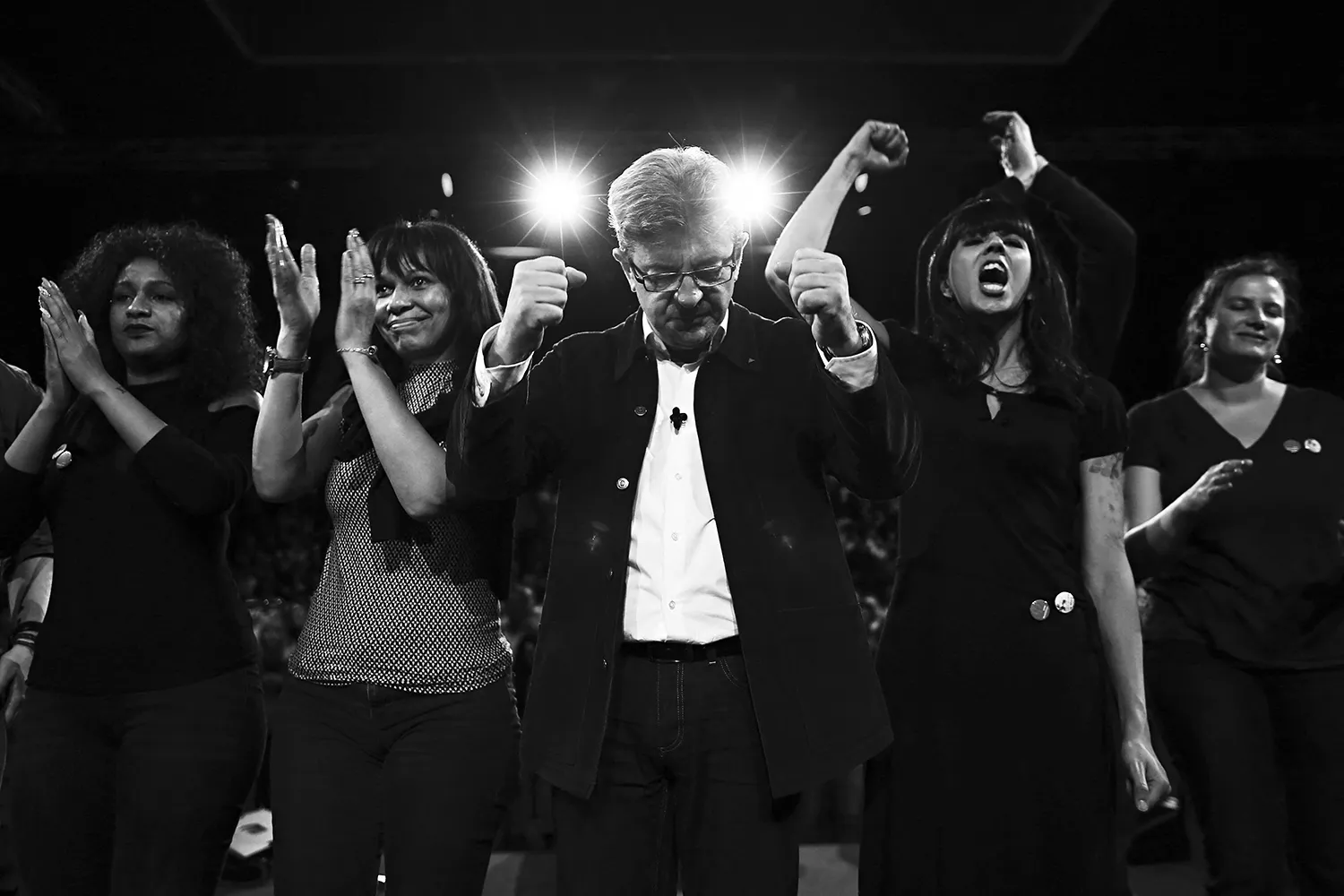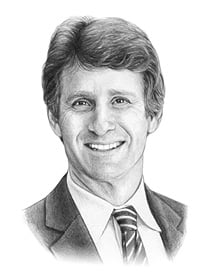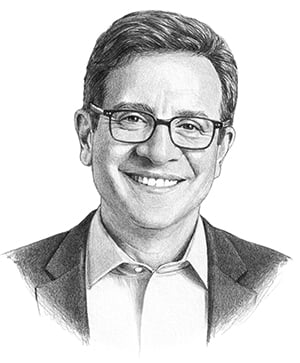The Morass of the French Left

Review
The Morass of the French Left
Jean-Luc Mélenchon, one of France’s most hated politicians, casts a shadow over the left at a critical juncture.
French presidential candidate Jean-Luc Mélenchon (center) on stage during a campaign rally in Le Havre, France, on March 29, 2017. Charly TriballeauAFP via Getty Images
Politicians in France tend to write a lot of books. Essays are expected of any serious presidential aspirant. Memoirs are a must for any politician worth their salt. And in a country where the ruling class still likes to profess a regard for high culture, officials occasionally indulge in more creative texts: Former Finance Minister Bruno Le Maire released two historical novels while in office, and former Gender Equality Minister Marlène Schiappa has published multiple self-help books about sex under a pseudonym. Former Prime Minister Dominique de Villepin once wrote a post-apocalyptic novel from the perspective of a tree.
Jean-Luc Mélenchon, the founder and leader of left-populist party La France Insoumise (LFI), is no stranger to the world of publishing. He has written more than 20 books since he emerged as a national political figure in the early 1990s, running the gamut from critical essays about the Socialist Party’s desertion of its left-wing roots and a polemic about Germany’s stranglehold on the European Union to various manifestos and interviews timed for election seasons.
Politicians in France tend to write a lot of books. Essays are expected of any serious presidential aspirant. Memoirs are a must for any politician worth their salt. And in a country where the ruling class still likes to profess a regard for high culture, officials occasionally indulge in more creative texts: Former Finance Minister Bruno Le Maire released two historical novels while in office, and former Gender Equality Minister Marlène Schiappa has published multiple self-help books about sex under a pseudonym. Former Prime Minister Dominique de Villepin once wrote a post-apocalyptic novel from the perspective of a tree.
Now, the People!: Revolution in the 21st Century, Jean-Luc Mélenchon, trans. David Broder, Verso, 320 pp., $29.95, April 2025
Jean-Luc Mélenchon, the founder and leader of left-populist party La France Insoumise (LFI), is no stranger to the world of publishing. He has written more than 20 books since he emerged as a national political figure in the early 1990s, running the gamut from critical essays about the Socialist Party’s desertion of its left-wing roots and a polemic about Germany’s stranglehold on the European Union to various manifestos and interviews timed for election seasons.
Yet the three-time presidential candidate’s 2023 book, Faites Mieux! Vers la revolution citoyenne, appears to be the first translated into English, released this month as Now, the People!: Revolution in the 21st Century.
In France, the book received a muted response. Reviewers treated it as a standard addition to the crowded genre of nonfiction from politicians, including those writing for left-wing outlets largely sympathetic to the author. This makes it all the more surprising that Mélenchon’s Anglophone publisher chose to present Now, the People! as a substantial theoretical text, heralding an “ambitious analytical framework” for understanding global politics.
There should be no doubt: By these metrics, the book does not live up the billing. But it does offer some insight into the 73-year-old Mélenchon’s views—and by extension, the conundrums of the stagnant French left.
Mélenchon, then-minister of professional training, near Paris in April 2000.Bernard Bisson/Sygma via Getty Images
Comparisons with left-wing U.S. Sen. Bernie Sanders can be tempting, but Mélenchon spent the first half of his career firmly within the political mainstream. He worked his way up through a Socialist Party that held the French presidency throughout the 1980s and the first half of the 1990s. Mélenchon only reinvented himself as an anti-establishment firebrand later in his career, identifying a void left by his party’s embrace of economic liberalism. If Sanders’ strength flows from his status as the consummate outsider—a man preaching the same basic message for decades—Mélenchon’s comes from his capacity for reinvention: for understanding his country’s shifting political sands and seizing the opportunities before him.
The first major turning point came in 2005. Breaking with Socialist Party leadership, Mélenchon campaigned for a “no” vote in France’s referendum on a new EU constitution, deriding the failed proposal as a neoliberal Trojan horse. Three years later, he launched the Left Party, and in 2012 he ran for president as its candidate, winning a respectable 11 percent of the first-round vote.
It wasn’t until 2017 that Mélenchon emerged as the dominant figure on the French left. That year, Socialist President François Hollande’s former economics minister, Emmanuel Macron, broke with his party and campaigned for president on a pro-business, socially liberal platform. He unexpectedly surged into the run-off round and easily defeated Marine Le Pen of the far-right National Rally. Mélenchon reaped the rewards of Hollande’s unpopular presidency in a different way: He won over millions of people with an ambitious platform calling for wealth redistribution and reinvestment in public services. He cast his new movement, LFI, as a continuation of the country’s revolutionary republican tradition.
Mélenchon won even more support in France’s most recent presidential election, in April 2022, finishing with 22 percent of the first-round vote. Le Pen went on to achieve a record number of votes for the far-right in the run-off against Macron, but only after besting Mélenchon by a meager 1.2 percentage points (420,000 votes).
In 2022, Mélenchon not only could point to a more ambitious economic agenda than his rivals on the left, but also solidified his front-runner status by criticizing issues such as police violence and Islamophobia that the political class routinely ignores. As Le Pen and her allies blasted immigration as an existential threat to French identity, Mélenchon seemed to be the only candidate to understand the importance of articulating a positive vision of difference, drawing on the work of poet-philosopher Édouard Glissant to celebrate France as a “creolized” society.
Then, Mélenchon reinvented himself again. He extended an olive branch to his former rivals, paving the way for left-wing parties to unite ahead of legislative elections in June 2022. Mélenchon was at the height of his popularity. And when the results of the vote revealed an electorate broadly split into three camps—the Macronists, the far right, and a newly united left—the latter finally seemed to have some momentum.
Mélenchon poses for a picture with supporters in Le Mans, France, on Feb. 4, 2022.Jean-Francois/AFP via Getty Images
Mélenchon published his book in France a year after the 2022 election cycle. As its French title (“faites mieux,” or “do better”) makes clear, this is the work of someone reflecting on his legacy. Mélenchon isn’t just taking stock of his accomplishments and outlining his vision of the world. He is thinking about how to pass the baton to younger generations.
To be sure, the book features flashes of brilliance. Picking up on a theme from his 2022 presidential campaign, Mélenchon delves into capitalism’s encroachment on time itself, decrying the proliferation of night work, 24-hour noise pollution, and the lack of visible stars—celebrating the “right to darkness” as a “fundamental human need.” His willingness to prioritize ecology marks a refreshing change from the progressive politicians who still treat the climate crisis as an afterthought.
And Mélenchon’s unflinching support for a trio of human-rights causes that are far from universally accepted is admirable, true to form for an early defender of gay rights. When he lauds “the right to voluntary termination of pregnancy, the freedom to identify as the gender of your own choosing and the right to die when you wish” as “three fundamental rights of self-determination,” one cannot help but think that someday he will be proved right.
But all of this feels more like a rambling campaign speech than a serious theoretical work. As Mélenchon acknowledges in the opening pages, he cannot help from jumping all over the place. There are many personal asides, and the lack of footnotes is glaring. Plenty of long-winded sentences lead nowhere.
Then, there are more profound flaws. Chief among them is the lack of attention devoted to the grassroots appeal of reactionary right-wing movements. Why are working people flocking to the far right in France and beyond? Why is nativism winning out over progressive economic populism? These are essential questions for any politician today, but Mélenchon seems oddly uninterested in grappling with them.
Instead, he prefers to focus on the social movements and parties whose values he admires—a set of disparate experiences that he crudely tosses under the banner of a “citizens’ revolution”: mass demonstrations in Cairo’s Tahrir Square, constitutional reforms in Venezuela and Ecuador, the Iranian protests of 2022, and even France’s movement against Macron’s unpopular move to increase the retirement age from 62 to 64 in 2023. It’s a framework that glosses over important distinctions between full-fledged dictatorships and embattled liberal democracies, bordering on insult for activists in the former.
Mélenchon’s vision of citizens as the dominant agents of social change also downplays the significance of the labor movement. Arguing that “today’s workforce” is “having a hard time putting up effective resistance,” he writes that labor has been “redeployed on a different terrain” and “expanded its role as part of the people.” Many leftists, though, would insist that concepts such as the working class still matter and that unions have a special role to play in organizing the billions of wage-earners around the globe. But in Mélenchon’s view, unions are just another potential ally, one more asset to be harnessed in support of his loosely defined citizens’ revolution.
Suffice to say, this vision has yet to win over a majority of the French population.
Mélenchon (right) and LFI coordinator Adrien Quatennens (left) during a meeting near Valence, France, on Aug. 29, 2021.Olivier Chassignole/AFP via Getty Images
Since 2022, the French left has not managed to establish itself as a progressive force to be reckoned with. Instead of presenting a united front, the country’s left-wing parties have spent much of the last three years criticizing each other, jockeying for position ahead of the next presidential election in 2027. Much of the responsibility lies with the Socialists, many of whom have not accepted the idea of becoming subordinate to a more radical partner. But Mélenchon’s obsession with retaining his dominant position has also fueled tensions. It’s an open secret that he intends to run in two years—at age 75—and his gambit appears to involve stifling dissent within his party and accentuating his differences with everyone else.
In the fall of 2022, Mélenchon rushed to the defense of Adrien Quatennens, an LFI lawmaker who admitted to slapping his wife, ignoring a call from feminist activists to exclude the rising star from the party. The following year, Mélenchon and his allies overhauled LFI’s internal structures, brushing aside long-standing calls to democratize the party and sidelining prominent dissident voices such as Clémentine Autain and Alexis Corbière.
At the same time, Mélenchon’s party has clashed with the rest of the left coalition over parliamentary strategy, endorsements of protests, and reactions to various news events. This includes Le Pen’s recent conviction for her role in a sweeping $3 million embezzlement scheme of EU funds—a decision that carries an immediate five-year ban on seeking public office, complicating her chances of running for president in 2027. While the Socialists, Greens, and Communists applauded the ruling, Mélenchon’s party said it disagreed with the principle of judges barring politicians from running from office.
France’s left coalition has also struggled to weather a political landscape marked by the fallout from Oct. 7, 2023, and Israel’s atrocities in Gaza. Like in the United States, supporters of Israeli government policy have lobbed accusations of antisemitism at defenders of Palestinian rights, while an opportunistic far right has sought to reinvent itself as a protector of the Jewish people. But Mélenchon’s track record of problematic comments has added another layer to debates in France, including his remark last year that antisemitism is only “residual” in the country.
Left-wing MPs hold portraits of children reported to have been killed by Israel’s military offensive in Gaza during a session at the National Assembly in Paris on April 8.Thomas Samson/AFP via Getty Images
Mélenchon continues to furiously deny accusations of antisemitism, inflaming critics across the political spectrum—and bad-faith actors looking for any reason to bash him and his ideas.
Last month, this routine hit new lows. After LFI posted an edited image of a far-right talk show host of Sephardic Jewish descent that bore a striking resemblance to 1930s antisemitic propaganda, lawmaker Paul Vannier apologized and blamed the snafu on Grok, the artificial intelligence chatbot launched by Elon Musk. The issue appeared resolved, but days later, Mélenchon contradicted his colleague in a public speech, suggesting that there was no problem with the image. The faux-naïf act is hard to believe from someone so knowledgeable of political history—and it cheapens his anti-racist discourse at a time when it’s desperately needed.
The French left did, of course, obtain a significant achievement last July. During snap legislative elections, parties reassembled as the New Popular Front and won more seats in the National Assembly than any other coalition, backed by millions of people fed up with having to choose between the National Rally’s anti-immigrant populism and Macronism’s hollowing out of social democracy. The unexpected result was a reminder that many French voters share a different vision for their country: one in which public services live up to their promise, the rich pay their fair share, and people aren’t discriminated against because of their origins.
Still, the elections didn’t exactly mark a resounding victory for the left. The coalition was far from winning an absolute majority, and its impressive result was only made possible by an emergency second-round pact with its centrist rivals, with scores of candidates dropping out to reduce the chances of the National Rally winning seats. The New Popular Front’s base is clear in opinion polls from the first round, which paint a worrying picture: According to IFOP, the National Rally won in every income bracket with the exception of the highest earners. And while an Ipsos study showed the New Popular Front dominating urban areas with more than 200,000 residents, the coalition did not fare as well elsewhere.
In the end, the French left suffers from the same problem ravaging left-of-center parties across Europe and North America: Outside of large metropolitan areas, working-class voters are turning their backs on the left. Nobody has been able to reverse the trend in France, neither the more moderate Socialists nor the left populists of LFI.
Left-wing LFI MP François Ruffin speaks with local residents as he goes door to door during a campaign in Flixecourt, France, June 20, 2024. Denis Charlet/AFP via Getty Images
As France’s next presidential election approaches, there is increased talk about finding a candidate capable of uniting the New Popular Front. Polls now regularly find Mélenchon to be one of France’s most hated politicians, but they don’t seem to be discouraging him from a fourth consecutive bid.
Though the names floated include Marine Tondelier and Olivier Faure—who lead the Greens and Socialists, respectively—perhaps the most natural successor to Mélenchon would be François Ruffin, a former journalist and filmmaker who has held a seat in a deindustrialized patch of northern France since 2017. First elected with LFI, Ruffin left the party last year, worried that his ties to Mélenchon would sink his reelection bid in an area that leans heavily toward the National Rally.
In French media, clashes between Mélenchon and Ruffin are sometimes reduced to dueling egos—but while ideologically similar, they share genuine differences over electoral strategy. In his latest book, Ruffin calls for expanding the left’s base of support beyond large urban areas, uniting the “France of small towns” and the “France of towers.” He yearns to rebuild the progressive electorate of another era: a majoritarian coalition rooted in the working class. And he believes the unity of left-wing parties is an essential precondition for victory.
On the other hand, Mélenchon has expressed interest in better mobilizing his party’s existing base, turning out greater shares of young people and low-income urban inhabitants to propel himself into the run-off—and then hoping for the best against a likely far-right opponent. This preference comes across clearly in Now, the People!, which includes a full chapter on “the city.” Mélenchon even describes “urban political consciousness” as an “advanced form of political consciousness.”
At any rate, this will almost certainly be the last presidential election in which Mélenchon will play a role—and it will likely define his legacy. Earlier in his career, he might have seemed like a modern-day George Marchais, the leader of a French Communist Party that took electoral politics seriously but was incapable of seriously contending for the presidency. At other times, he has shown shades of François Mitterrand, the wise statesman who reinvented himself multiple times before finally winning the presidency.
The leader of LFI would probably like to be remembered as a French Bernie Sanders, a principled opponent of authoritarianism and oligarchy. The risk, however, is that unless he heeds his own words—“faites mieux”—he may end up like former U.S. President Joe Biden, an unpopular politician whose inability to step aside before it was too late helped pave the way for the far right to take power.
Books are independently selected by FP editors. FP earns an affiliate commission on anything purchased through links to Amazon.com on this page.
Cole Stangler is a journalist based in Marseille who writes about labor and politics. He is the author of the forthcoming book Le Miroir Américain. Bluesky: @colestangler.bsky.social X: @colestangler
More from Foreign Policy
-

An illustration shows a line of large shopping carts facing down a small Donald Trump figure holding two shopping bags. The stars of China’s flag are in the upper left corner. Why Beijing Thinks It Can Beat Trump
China’s elites have a new confidence in their own system.
-

U.S. Army Chief of Staff Randy George speaks to U.S. soldiers at the Hohenfels Training Area in southern Germany on Feb. 6. A Drawdown of U.S. Forces in Europe Is All but Certain
Here’s how the Pentagon can rebalance its approach to the continent without sacrificing U.S. interests.
-

University of California, Los Angeles students, researchers, and demonstrators rally during a “Kill the Cuts” protest against the Trump administration’s funding cuts on research, health, and higher education in Los Angeles on April 8. Why Authoritarians Attack Universities First
A Yale professor and expert on fascism talks about why he’s leaving the United States under Trump.
-

Dwight D. Eisenhower looks over a piece of paper while sitting on a couch as Robert Cutler looks over his shoulder. How Generations of Experts Built U.S. Power
And now Trump is throwing it all away.














Join the Conversation
Commenting on this and other recent articles is just one benefit of a Foreign Policy subscription.
Already a subscriber?
.
Subscribe
Subscribe
View Comments
Join the Conversation
Join the conversation on this and other recent Foreign Policy articles when you subscribe now.
Subscribe
Subscribe
Not your account?
View Comments
Join the Conversation
Please follow our comment guidelines, stay on topic, and be civil, courteous, and respectful of others’ beliefs.
Change your username |
Log out
Change your username:
CANCEL
Confirm your username to get started.
The default username below has been generated using the first name and last initial on your FP subscriber account. Usernames may be updated at any time and must not contain inappropriate or offensive language.